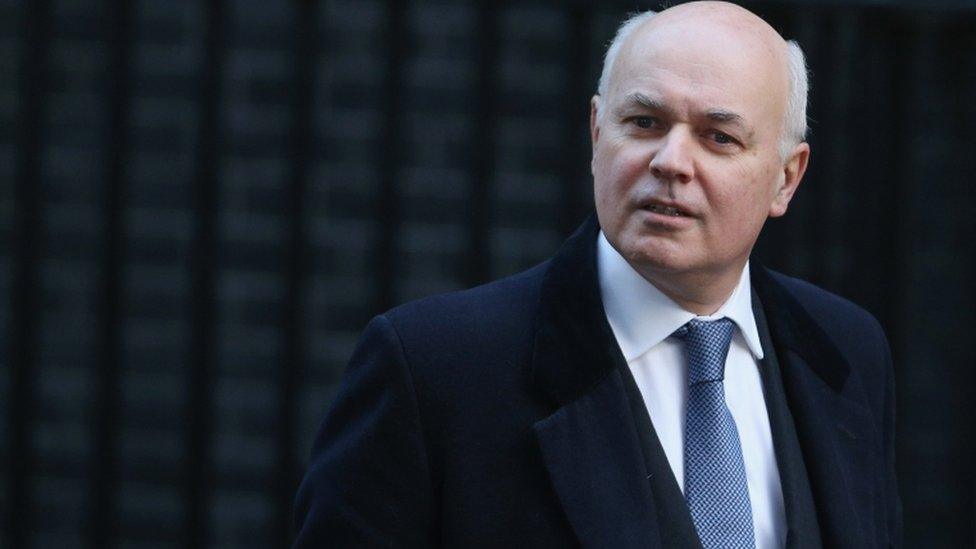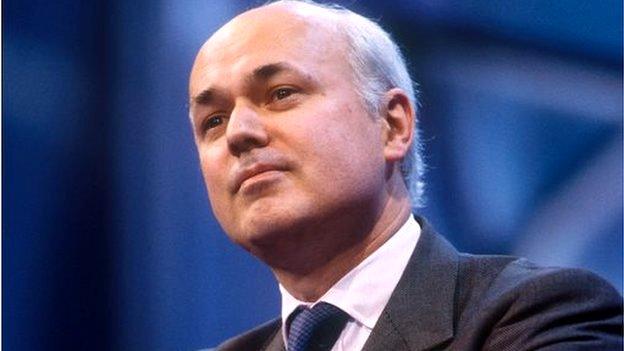Employment and Support Allowance should not be cut - campaigners
- Published

Iain Duncan Smith has been asked to reverse the cuts
Disability groups have written an open letter to Work and Pensions Secretary Iain Duncan Smith, urging him to abandon planned cuts to a key benefit.
The House of Lords will vote next week on government plans to cut £30 a week from Employment and Support Allowance (ESA) for some new claimants from 2017.
The letter says it will make it harder for disabled people to find work.
But the Department for Work and Pensions says the campaigners are "scare-mongering".
"[The letter] fails to acknowledge that existing claimants and those with the most severe disabilities will not be affected at all," a spokesman said.
From April 2017, ministers are intending to reduce the amount of money people in one category of ESA receive, taking approximately £30 a week from new claimants who are deemed to be capable of making some effort to find work.
The change will bring the benefit rate in line with Jobseeker's Allowance.
'Closer to poverty'
More than 30 charities and members of the Disability Benefits Consortium, including Mencap, Mind and Parkinson's UK, and three peers, including Baroness Tanni Grey-Thompson, the record-breaking Paralympian, signed the open letter to Mr Duncan Smith.
The letter said the change would "push sick and disabled people further away from work and closer to poverty".
"The government says this £30 disincentivises sick and disabled people from finding work, but it has so far offered no evidence for this claim," the letter said.

Analysis

By Michael Buchanan, BBC social affairs correspondent
Ministers have struggled to control the cost of Employment and Support Allowance.
An analysis produced last summer by the Office for Budget Responsibility saw them once more increasing the forecast costs for ESA.
The official reason is that more people than expected are on the benefit, a consequence of an increasing number of people successfully appealing against a decision to deny them the benefit, and problems in processing fit-for-work tests that decide if claimants are eligible.
However, internal DWP documents I've seen previously suggest there is a belief in government that people are applying for ESA rather than Jobseeker's Allowance.
They get more money on ESA and the demands to apply for jobs aren't as great.
The planned reforms, for some new claimants in 2017, will bring the ESA benefit rate in line with Jobseeker's Allowance and provide more support for people to find a job, albeit with tougher conditions if they don't comply.
Ministers hope the reforms will save money and get more people into work.

Mind policy and campaigns manager Tom Pollard said: "There is a complete lack of evidence to show that stopping, or threatening to stop, someone's financial support is an effective approach.
"In fact, pressurising people with mental health problems to engage in activities under the threat of losing their benefit is counter-productive, causing additional anxiety, often making people more unwell and less able to work."
Jan Tregelles, Mencap's chief executive, said disabled people were telling the charity "loud and clear" that the cut to ESA "will make their lives harder, with both their health and chances of returning to work being harmed".
A DWP spokesman said the government was "committed to ensuring that people have the best support possible".
"The current system needs reform because it fails to provide the right incentives, and acts to trap people on welfare," the spokesman said.
"The truth is that ESA sanctions are falling, and are only used as a last resort for the tiny percentage of people who don't take up the help on offer - fewer than 1% in any given month."
- Published24 August 2015

- Published2 July 2015
